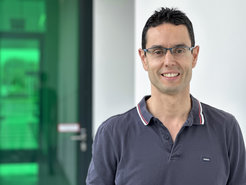New Director at the Max Planck Institute for Molecular Biomedicine
Rui Benedito brings innovative genetic tools for research into disease-relevant cell processes to Münster
Genetic mutations are among the central causes of numerous diseases – from cardiovascular disease to cancer. However, in order to really understand the consequences of these mutations, new genetic tools allowing a higher resolution analysis at the level of single cells are needed. This is precisely where the research of Rui Benedito, who has been appointed as the new Director at the Max Planck Institute for Molecular Biomedicine in June 2025, comes in.
Rui Benedito becomes Director at the Max Planck Institute for Molecular Biomedicine

Dr. Rui Benedito has been appointed as the new Director of the Department of Functional Genetics at the Max Planck Institute for Molecular Biomedicine in Münster on June 1, 2025. He will initially take up the position part-time during a transition phase and will be fully on site from September 2025. In Münster, he will further advance his internationally recognized research on the understanding of gene function in healthy and diseased cells.
Rui Benedito succeeds founding director and pioneer of cell adhesion research Dietmar Vestweber, who remains active at the Max Planck Institute with a research group as Emeritus. Rui Benedito's appointment marks the conclusion of a strategic renovation of the Institute, which was initiated in the course of two emeritus appointments within 5 years.
"I am very happy to return to Münster. I worked here as a postdoc before and know the excellent science and inspiring atmosphere at the Institute and in Münster’s scientific community", says Rui Benedito.
With his appointment, the Institute has gained a proven expert in genetic modeling and cardiovascular biology. Benedito comes from the Centro Nacional de Investigaciones Cardiovasculares (CNIC) in Madrid and brings with him a comprehensive arsenal of newly developed genetic methods, which will be applied and further developed in Münster in the future.
Tracing mutations in individual cells – within the living organism
Benedito's research aims to gain a precise understanding of how genetic mutations change the biology of individual cells – and what consequences this has for the development and treatment of diseases. To this end, his group is developing novel genetic tools that can be used to generate mutations in individual cells in a very precise and traceable manner. The resulting models allow a previously unattainable resolution in functional genetics: "We can now analyse and quantify very precisely how mutant cells behave in comparison with normal cells over long periods of time and in a living organism", explains Rui Benedito.
The new department complements the existing research areas at the institute and also benefits from its great infrastructure: "The close scientific proximity to the groups of Sara Wickström and Ralf Adams as well as the excellent technical support from the MPI-BM core facilities, will enable me to perform outstanding biomedical research" says Benedito.
New paths for cardiovascular research
One focus of Benedito's research is on cardiovascular biology. His group has deciphered fundamental processes of vascular growth and artery formation and is using this knowledge to promote the formation of new blood vessels and arteries after a myocardial infarction.
His research also enabled a better understanding of the effects and toxicity of drugs inhibiting or promoting blood vessel growth.
Interdisciplinary research with a systematic approach
Benedito's approach combines state-of-the-art genetics with imaging and single-cell analyses. The tools developed – such as genetic "barcodes" for the simultaneous analysis of many cell types – have significance far beyond cardiovascular research. His work makes it possible to systematically investigate complex disease processes in all individual cells of a living organism – and makes Münster a center for functional genetics at the highest level.
"With Rui Benedito, our institute is not only gaining an outstanding scientist, but also a pioneer in a research field that perfectly complements our research spectrum," says Sara Wickström, Managing Director at the institute. "His genetic tools open up new perspectives for many projects at our institute – not only in the field of vascular biology, but for cell and tissue dynamics across organs and model systems. This also significantly strengthens the Münster site."
